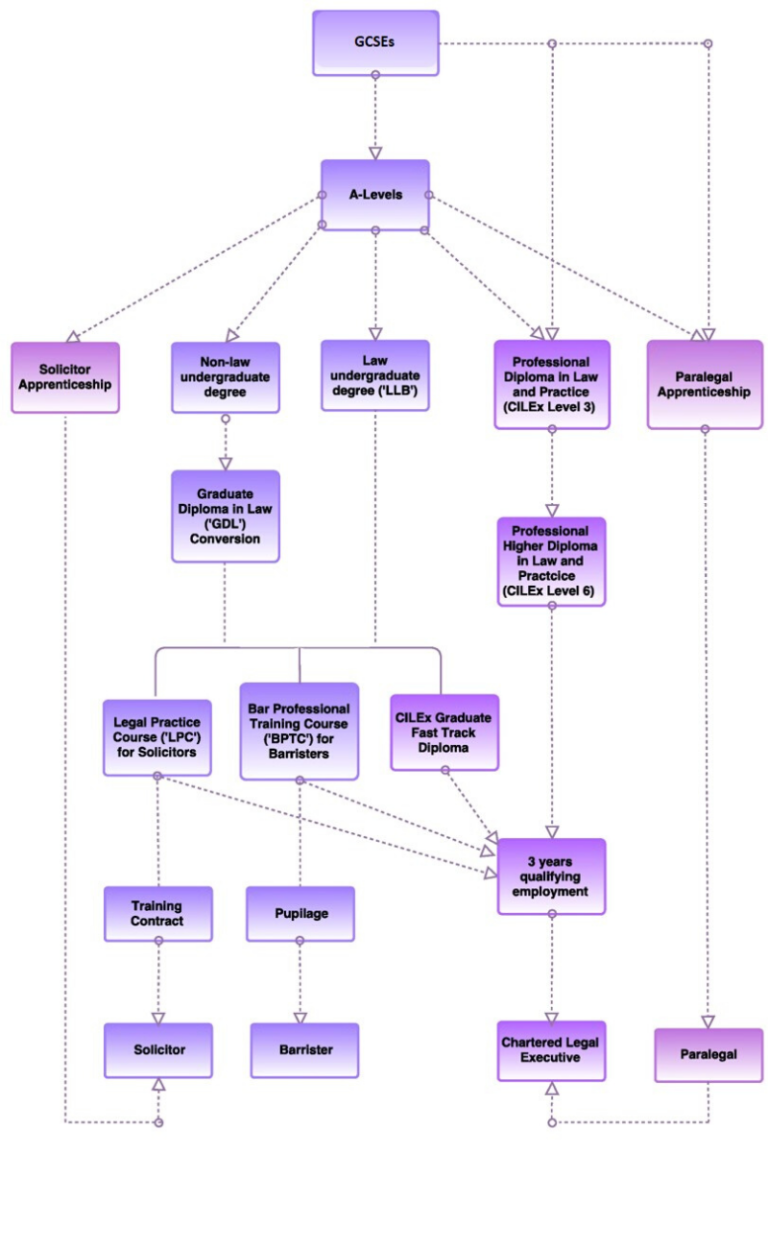








Routes into Law
PLEASE NOTE: In light of changes that are yet to be implemented by the Solicitors Regulation Authority, this section will be edited and updated accordingly.
Routes into Law
Information provided by Ed Kirton-Darling
Solicitors
Current Approach:
- Regulation by the SRA who are themselves regulated by Legal Services Board
- Academic stage (QLD/LLB) → LPC → Vocational Stage (Training Contract + Professional Skills Course)
- QLD/LLB: Required to study the ‘Foundations of Legal Knowledge’ which includes modules for Public law, Criminal law, Equity and Trusts, Contract, Tort
- LPC: Required to study Property Law & Practice, Litigation (Civil + Criminal), Wills & Probate, Tax, Business Law & Practice, Ethics and Solicitor Accounts
- Training Contract: 2 years, must include a range of training, signed off by training principle

For LLB Students
Aspiring solicitors who are currently in their years of LLB study will be studying for 3-4 years, depending on whether or not they are studying abroad or doing a placement year. During this period, students will be studying from a list of core modules listed by the Solicitors Regulation Authority in order to successfully obtain a qualifying law degree (QLD). Currently, Kent Law School allows for both single honours and joint honours law students to receive a QLD upon completion.
After LLB students obtain their QLD, there are a variety of avenues available to them. They may seek legal work experience in a firm, applying for legal secretary, assistant, or paralegal roles. These are great things to mention in future training contract applications, as they really show your commitment to a career in the legal sector.
The next step in becoming a qualified solicitor is by completing the Legal Practice Course (LPC). The course can either be self-funded or funded through your training contract sponsor. The course can be completed in 12 months, or through an accelerated 6 month option. If you are being sponsored for the LPC, your sponsor will tell you which of the two options you will be opting for, as well as where you will be completing the course.
Upon completion of the LPC, you must begin your 2 year long training contract. During this period you will be a ‘trainee solicitor’ and carrying out 6 month long ‘seats’ within the firm that is training you.
When the 2 year training contract period is over, you are officially a qualified solicitor!
For non-LLB Students
These students are strongly encouraged to get involved with Kent Student Law Society, as we have a variety of events and talks available to show your interest in law regardless of your degree!
Due to non-LLB graduates not receiving a QLD after the completion of their degree, they must study the Graduate Diploma in Law (GDL) before starting the LPC. Much like the LPC, the GDL can either be self-funded, or paid for by the firm that is seeking to train you upon completion of both courses.
GDL completion is followed by studying for the LPC, before also beginning your two year long training contract.
New Approach: For those who start after September 2021
- No more QLD
- In order to become a Solicitor, candidates require in any order: 1. A Degree (not necessarily law) 2. Pass 2 sets of centralised assessments (SQE) 3. Undertake Qualifying Work Experience
SQE 1: Functioning Legal Knowledge
- Details to be confirmed but proposed 11 or 15 hours of closed book exams over 2 or 2.5 days
- Day 1: 5.30 hrs to complete 180 questions
- Day 2: 5.30 hrs to complete 180 questions
- Day 3: 4 hrs of legal research and writing assessments → 2 x 1 hr legal research exercises, 4 x 30 minute writing exercises
- Ethics and Professional Conduct: Pervasively across day 1 & 2
- 2 broad areas covered: 1. Business Law and Practice; Dispute Resolution; Contract; Tort; Legal System of England and Wales; Constitutional and Administrative Law and EU Law and Legal Services 2. Property Practice; Wills and the Administration of Estates; Solicitors Accounts; Land Law; Trusts; Criminal Law and Practice → Sample Questions:
SQE 2: Skills Assessments (Can’t do SQE 2 until passed SQE 1)
- Legal Skills: Client interviewing & attendance note/legal analysis, oral presentation/advocacy, case and matter analysis, legal research and written advice, legal drafting
Assessments set in two different contexts: Criminal Litigation (including advising clients at the police station), Dispute Resolution, Property Practice, Wills and
- Intestacy, Probate Administration and Practice, Business organisations, rules and procedures.
Costs
- SRA estimates: SQE1- £1,100-£1,650; SQE2- £1,900-£2,850
- Costs above are not finalised yet and so the above cost is for the exams alone
- 3 attempts allowed at the SQE within 6 years
Qualifying Work Experience
- Signed off by a Solicitor as to whether trainee had an opportunity to develop prescribed competences for solicitors: Ethics, professionalism and judgment, technical legal practice, working with others, managing yourself/your work
- Minimum 2 years (Can be 4 different places of different lengths)
- Can be paid or unpaid →on placement during a law degree, on a vacation scheme, working in a law clinic, at a voluntary or charitable organisation such Citizen Advice or a law centre, working as a paralegal, on a training contract.
Resources
- SRA – ‘I want to be a solicitor’ https://www.sra.org.uk/sra/policy/sqe/solicitor-persona/
- Latest developments/Briefings on the SQE: https://www.sra.org.uk/sra/news/sqe-update/
- Assessment Specification for SQE1: https://www.sra.org.uk/sra/policy/sqe/sqe1-functioning-legal-knowledge-assessment-specification/
- Statement of solicitor competence: https://www.sra.org.uk/solicitors/resources/cpd/competence-statement/
Barristers
- Barristers still need to have a law degree, and then undertake a Bar course and do pupillage.
- Abolishment of the old Bar course, but the new system is not hugely different to the old one, the main difference is that providers of the vocational stage have more flexibility in how to design that course.
Guidance on qualifying for the Bar is available here: https://www.barstandardsboard.org.uk/training-qualification.html
And there is a useful overview here: https://www.barstandardsboard.org.uk/training-qualification/becoming-a-barrister.html
International Students
- For international students who are currently studying: There should be no change, as you will have a QLD, but you should check this to be sure.
For international students starting after September 2021: it will depend on the jurisdiction and we are waiting to get more detail on this
